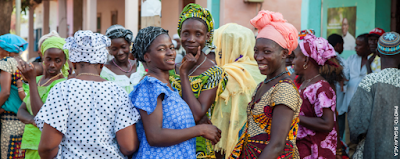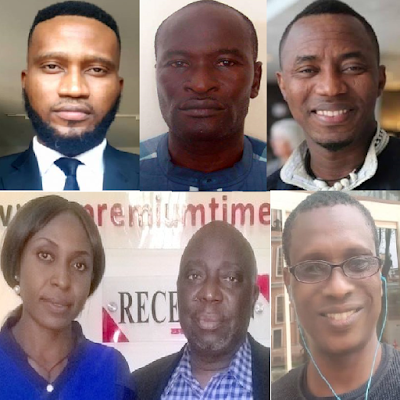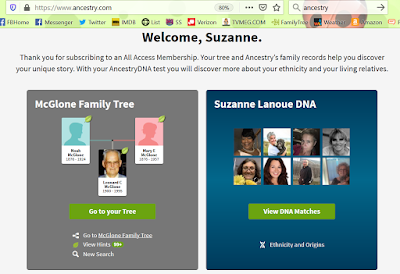Assignment #2: Digital Access
Nigeria
I chose Nigeria for this paper for three reasons. For one thing, we used to have a friend from there named Arthur Onuora. He was in the Political Science program at Stony Brook with my husband back in the 80's and was very nice. The second reason is that one of the volunteers for my website, Ebele Orakpo, lived in Nigeria. I thought it was so cool that she would be interested in writing about U.S. TV all the way from Africa. She proofread for us, so her English was very good. Lastly, there is a new TV show on CBS that I like called "Bob Hearts Abishola," where an American sock salesman falls in love with a Nigerian nurse. They also show her aunt, uncle, and son, as well as some workers at the sock factory, and at the hospital, that are also Nigerian. They sometimes speak Nigerian on the show (with subtitles). All of this combined to make me interested in Nigeria and how they access media.
According to Wikipedia, "Nigeria is the most populous country in Africa and the seventh most populous country in the world." Also, over a million Nigerians have emigrated to the U.S. during tough economic times in their country. This is fascinating to learn. After years of corruption, military rule and mismanagement, democracy and reforms have made the country more prosperous. They're the largest economy in Africa and have one of the fastest growing telecommunications markets in the world.
However, there's a great digital divide in the country due to poverty, poor education, lack of electrical infrastructure, urban drift, and some other factors. One third of Nigerians don't have basic literacy. Most of the citizens in Nigeria live in rural areas. Things have been changing, though. The government is working with Google and other companies to give access to more people in Nigeria.
The Nigerian government has set up e-learning facilities in libraries to extend educational opportunities. The Computers for All Nigerians Initiative (CANi) is a program that provides personal computers and the Internet to more people. This is funded by government aid, tax waivers and support from technology companies such as Microsoft.
The U.S. Agency for International Development and its partners have a program to help increase primary school reading skills. This article describes some of the challenges that students face while trying to get an education, including terrorist attacks by the Boko Haram on schools and children (particularly girls). A group of African experts at The Brooking Institute have studied the digital divide problem and pinpointed what needs to be done to improve Nigeria's economic, educational and social problems. One positive factor is that a governor of one of their states is working hard to improve the schools in his area, and other parts of the country are planning to do the same.
Nigeria is having a big technology and startup boom, thanks to the efforts by the government to improve digital access, with the help of international corporations. Freedomhouse.com rated Nigeria as partly free, with a score of 34 out of 100. Only 26% of the country has Internet access, but they have more Internet access than any other sub-saharan country. The reason they're rated so low on the freedom scale is because the government or police sometimes arrest bloggers and other members of the press, and they restrict certain types of stories. They use a new "cyberstalking" law as an excuse to arrest people. However, few are prosecuted.
Even though Nigeria has a lot of oil, which should make them prosperous, they have problems that affect Internet access, such as the electrical power going out often. They only have electrical energy 10 hours a day per average. Nigerians with more money can afford a backup generator. The digital divide also brings a gender divide. In their largest city, Lagos, women were 50% less likely to have Internet access than their male counterparts. They have almost 200 million people, but fewer than 300,000 are connected to ISP's.
Another problem that affects access is that most Internet sites are in English. Nigeria has over 500 different languages, which are under-represented online. This factor increases the digital divide.
Although
some members of the press have been arrested (as noted above), the content of their
media is generally not suppressed, and citizens have access to social
media of all types. Smartphone access to the Internet has increased in recent years, too, due to low cost mobile access.
In the past 20 years, the number of available ISP's has grown by quite a lot. There are many signs like these that the country is doing quite a lot to improve the digital divide. They even worked with China to launch a satellite that would increase their telecommunications ability. A second Chinese satellite is expected soon.
It seems pretty clear that they need to do more. Since so many of their citizens can't read, and 70% live in rural areas with no electricity, they would need to fix those basic problems if more of their citizens are going to have access. Poor economic, political and infrastuctural conditions affect the country's literacy and digital access. These conditions need to be improved if Nigeria is ever going to grow out of being a "developing country" and have better access for their citizens.














Comments
Post a Comment